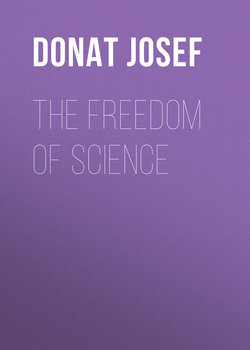Читать книгу The Freedom of Science - Donat Josef - Страница 8
First Section. The Freedom of Science and its Philosophical Basis
Chapter II. Two Views Of The World And Their Freedom
The Modern Idea of Freedom
ОглавлениеThe Christian view of man and his freedom, which to past ages appeared self-evident, has grown obscure to many minds, and given place to another, a more modern view.1
For the modern man, freedom, especially freedom of intellectual life, means independence from external ties, from all authority, or, to express it positively, absolute right of self-determination, autonomy. He does not recognize any law or rule which he has not imposed upon himself. In civil life, of course, it is a principle that man must submit to external, legal restraint in many things that do not directly concern his own person, but only so far as is necessary in order that others, too, may enjoy the same freedom; but also here every citizen must be able to share in the legislation, according to the rules of constitutional or republican government. But he must be free from every external restraint in whatever touches the core of his personality, his feeling, desire, thought, and the expression of his thought.
It should now be clear, from what has been said, what is meant by freedom of science. It means independence from every external authority and restraint in research and teaching, the unhindered development and assertion of one's own intellectual personality. Man must let himself be directed only by his own judgment and his instinct for the truth, or his personal need, without heeding dogmas, Church laws, tradition, or any other external norm whatsoever. This is particularly true in the domain of philosophy and religion, in questions regarding the world and life, and in fundamental social questions. This is principally, and almost exclusively, the field in which an authoritative influence of the Church, or state, or society in general, is to be feared. Hence the importance of the question of the freedom of science in this field.
This is also the manner in which the advocates of modern freedom of science unanimously describe it.
For the academic teacher, says G. Kaufmann, there are “strictly speaking only the barriers drawn by his own instinct for the truth. It is in this sense that we demand freedom of science to-day for the university teacher. The freedom of the scientist and of the academic teacher must not be limited by patented truth, nor by faint-hearted consideration” (Die Lehrfreiheit an den deutschen Universitaeten im neunzehnten Jahrhundert (1898), 36). The first resolution proposed at the Second Conference of German University Teachers, at Jena, in September, 1908, was this: “The purpose of scientific research, and the communication of its results, demand that it be independent of every consideration foreign to scientific method itself.” Of this resolution we have from another source the following explanation: “Therefore, it should be independent especially of tradition and the prejudices of the masses, independent of authority and social bodies, independent of party interest.” (This was the addition to the thesis as originally formulated by Prof. von Amira. Beilage der Muenchener Neuesten Nachrichten, July 9, 1908.) And Prof. F. Paulsen writes: “No thought can be commanded or forbidden the academic teacher or his audience” (Die deutschen Universitaeten und das Universitaets-studium, 1902, 288).
A. Harnack likewise teaches that “In regard to research and knowledge there must be unlimited freedom,” especially in matters of religion. Here “man must fully understand his own innermost being; the soul must recognize its own needs and the indicated way to their satisfaction. This it can do only when it is entirely free.” “The fear that thereby the door to serious error is thrown open should not in the least deter it, for the most serious error of all is the opinion that man should not enjoy perfect freedom in the determination of his state”(Neue Freie Presse, 7 Juni, 1908).
The same demands are made by free-thinkers, who are always and everywhere in favor of free science. The International Congress of Free-thinkers, held at Rome in June, 1904, thus defines free-thought: “Since free-thought cannot concede to any authority whatever the right to oppose human reason, or even to supersede it, it demands that its advocates reject directly not only any compulsory belief, but also every authority that tries to enforce its dogmas, even though such an authority be based on revelation, or though it command obedience to dogmas or a-priori principles of philosophy, or to the decisions of public authority or the vote of a majority.” – We shall have frequent occasion to speak of this freedom in these pages.
Hence it is easily seen that this view differs from the one we considered before. Freedom from all external restraint has superseded freedom from unjust restraint. The presumption has found acceptance that every interference by authority is unjust, a violation of the natural rights of man and his thought. On what is this presumption based? In other words: What are the philosophical premises of modern freedom of science? We shall be occupied with this question now for some time. For only after we have attentively considered it, can we gain an intelligent idea of the nature of this freedom, of its methods, and of the justice of its claims. Advocates of this view not infrequently think they have exhausted its meaning when they have protested against ecclesiastical encroachments, when they have held forth against Syllabus and Index. Of the deeper thoughts it contains they have scarcely any idea.
1
Whenever we use here the word “modern,” we do not take it in the sense of “present,” – the Christian view of the world is also a present one, and is still of the utmost importance, – but in the sense of “new” in contrast to the time-honoured and inherited.
